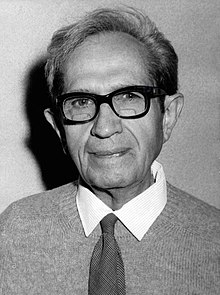Our website is made possible by displaying online advertisements to our visitors.
Please consider supporting us by disabling your ad blocker.
Albert Claude
Albert Claude | |
|---|---|
 | |
| Born | 24 August 1899 Longlier, Neufchâteau, Belgium |
| Died | 22 May 1983 (aged 83) Brussels, Belgium |
| Nationality | Belgian |
| Citizenship | Belgium and United States |
| Alma mater | University of Liège |
| Known for | Cell fractionation Electron microscopy in biology |
| Spouse | Julia Gilder |
| Children | Philippa |
| Parents |
|
| Awards | Louisa Gross Horwitz Prize in 1970 Paul Ehrlich and Ludwig Darmstaedter Prize in 1971 Nobel Prize in Physiology or Medicine in 1974 |
| Scientific career | |
| Fields | Cell biology |
| Institutions | Rockefeller University Institut Jules Bordet Université libre de Bruxelles Université catholique de Louvain |
Albert Claude (French pronunciation: [albɛʁ klod]; 24 August 1899 – 22 May 1983) was a Belgian-American cell biologist and medical doctor who shared the Nobel Prize in Physiology or Medicine in 1974 with Christian de Duve and George Emil Palade. His elementary education started in a comprehensive primary school at Longlier, his birthplace. He served in the British Intelligence Service during the First World War, and got imprisoned in concentration camps twice. In recognition of his service, he was granted enrolment at the University of Liège in Belgium to study medicine without any formal education required for the course. He earned his Doctor of Medicine degree in 1928. Devoted to medical research, he initially joined German institutes in Berlin. In 1929 he found an opportunity to join the Rockefeller Institute in New York. At Rockefeller University he made his most groundbreaking achievements in cell biology. In 1930 he developed the technique of cell fractionation, by which he discovered the agent of the Rous sarcoma, as well as components of cell organelles such as the mitochondrion, chloroplast, endoplasmic reticulum, Golgi apparatus, ribosome, and lysosome. He was the first to employ the electron microscope in the field of biology. In 1945 he published the first detailed structure of cell. His collective works established the complex functional and structural properties of cells.[1]
Claude served as director at Jules Bordet Institute for Cancer Research and Treatment and Laboratoire de Biologie Cellulaire et Cancérologie in Louvain-la-Neuve ; Professor at the Free University of Brussels, the University of Louvain, and Rockefeller University. For his pioneering works he received the Louisa Gross Horwitz Prize in 1970, together with his student George Palade and Keith Porter, the Paul Ehrlich and Ludwig Darmstaedter Prize in 1971, and the Nobel Prize in Physiology or Medicine in 1974 with Palade and his friend Christian de Duve.[2]
- ^ Claude, Albert. "Albert Claude – Biographical". www.nobelprize.org. Nobel Media AB. Retrieved 4 February 2014.
- ^ Altman, Lawrence K. (24 May 1984). "DR. ALBERT CLAUDE DEAD AT 84; WON NOBEL PRIZE IN MEDICINE". The New York Times. Retrieved 4 February 2014.
Previous Page Next Page


